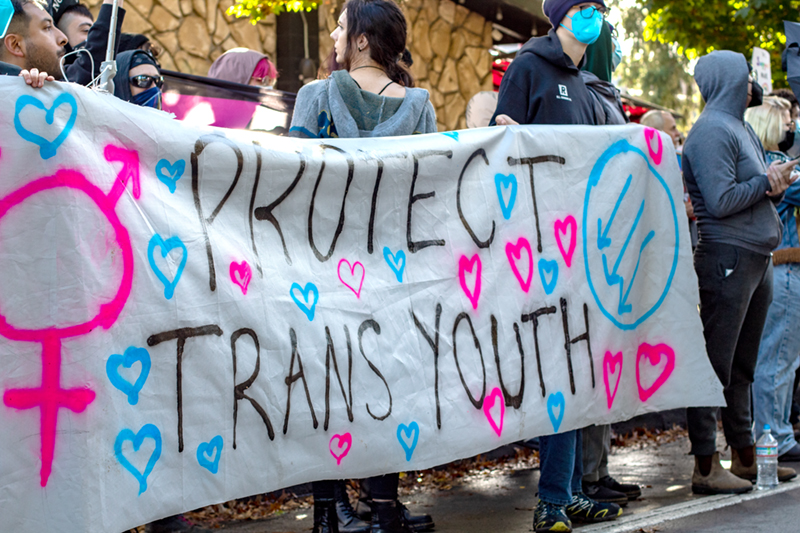Study Says Youth Don’t Identify as Trans Because of “Social Contagion”
Study appears to refute oft-cited claims about transgender youth made by politicians and gender identity skeptics.

A new study pushes back against frequently repeated talking points used by anti-transgender activists, arguing that transgender youth do not identify as such due to “social contagion,” peer pressure, or to escape stigma related to their sexual orientation.
In a study, published on Aug. 3 in the journal Pediatrics, researchers found that the percentage of adolescents identifying as transgender actually declined between 2017 and 2019. That finding challenges the claim, often repeated by skeptics of gender identity, that the number of people identifying as transgender is climbing due to broader societal acceptance, the influence of social media, and peer pressure.
The findings were based on data collected from the Centers for Disease Control and Prevention’s Youth Risk Behavior Survey, a biennial national survey distributed to high school students asking them about the environment they face at school, their mental well-being, and their health habits, including drug or alcohol use.
Although the CDC survey does not require states to record students’ gender identity, questions about sexual orientation have been administered since 2015, and 16 states opted to include questions asking students about their gender identity in 2017 and 2019. (Data for 2021 is not yet available.)
Using the data from those states, researchers found the most trans youth were assigned male at birth — a finding that runs counter to claims that females with poor self-image, autism or lack of social skills are more likely to identify as transgender due to social media or peer pressure. In fact, the percent of trans-identifying youth assigned female at birth fell from 1.9% in 2017 to 1.4% in 2019, the study found.
Those findings would seem to disprove the “social contagion” hypothesis, which stems from a 2018 study of online parent forums, which claimed that children are more likely to experience “rapid onset gender dysphoria” when they spend more time using the Internet or have friends who identify as transgender. That study has since been critiqued by other researchers and criticized for its flaws, which lead the editor-in-chief of PLOS ONE, the journal that initially published the study, to issue an apology for “oversights that occurred during the original assessment of the study.”
The study published in Pediatrics also found that data did not support another theory, which claims that cisgender youth identify as transgender in order to avoid stigma or bullying that result from identifying as gay or lesbian. Based on student responses, rates of bullying victimization were actually higher among transgender youth than cisgender youth who identify as gay, lesbian, bisexual, or some other sexual minority.
Jack Turban, the lead author of the study, who works as an assistant professor of child and adolescent psychiatry at the University of California San Francisco, told The Hill that experts in transgender health who work with youth experiencing gender dysphoria have generally not given much credence to the theory that LGB youth identify as transgender to avoid bullying or stigma.
“That simply isn’t what we generally see in clinical practice,” he said. “Sadly, work in this area has become highly politicized.”
The study drops as several state legislatures, especially those under Republican control, have promulgated bills seeking to restrict transgender visibility by banning it from being discussed in schools — even in sex education or health classes — banning books that feature transgender characters, limiting what facilities transgender youth may access, barring transgender youth from participating in sports based on their gender identity, and seeking to criminalize doctors who prescribe gender-affirming medical treatments like hormones or puberty blockers to youth struggling with gender dysphoria, as well as parents who allow their children to receive such treatments.
Many of those who push such legislation have claimed that identifying as transgender is a mental disorder, that gender dysphoria is temporary, and that upwards of 70% of dysphoric children will later identify as cisgender. Those lawmakers have pushed theories like the “social contagion” narrative, or have claimed that positive media portrayals of LGBTQ people are unduly influencing children to identify as transgender.
Turban says it’s difficult for those who have worked with transgender youth to see them targeted by legislation placing various restrictions on their lives — especially if such legislation is based on faulty understandings of gender identity or flawed science.
“The damaging effects of these unfounded hypotheses in further stigmatizing transgender and gender diverse youth cannot be understated,” Turban told NBC News in a statement. “We hope that clinicians, policymakers, journalists, and anyone else who contributes to health policy will review these findings.”
Support Metro Weekly’s Journalism
These are challenging times for news organizations. And yet it’s crucial we stay active and provide vital resources and information to both our local readers and the world. So won’t you please take a moment and consider supporting Metro Weekly with a membership? For as little as $5 a month, you can help ensure Metro Weekly magazine and MetroWeekly.com remain free, viable resources as we provide the best, most diverse, culturally-resonant LGBTQ coverage in both the D.C. region and around the world. Memberships come with exclusive perks and discounts, your own personal digital delivery of each week’s magazine (and an archive), access to our Member's Lounge when it launches this fall, and exclusive members-only items like Metro Weekly Membership Mugs and Tote Bags! Check out all our membership levels here and please join us today!




























You must be logged in to post a comment.